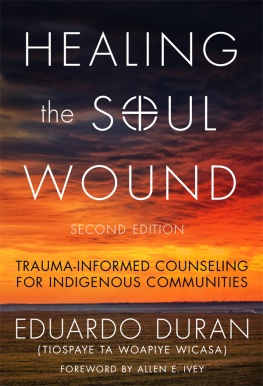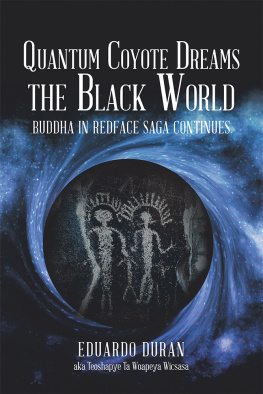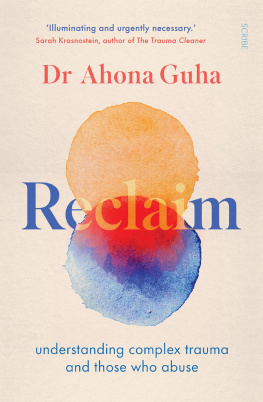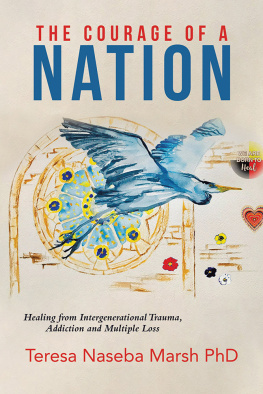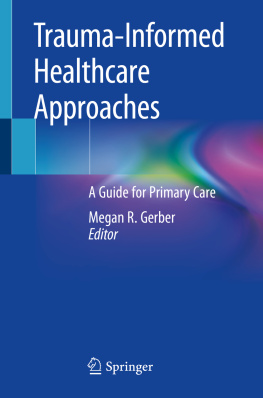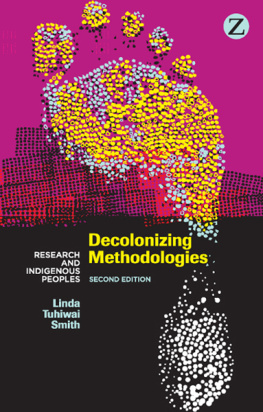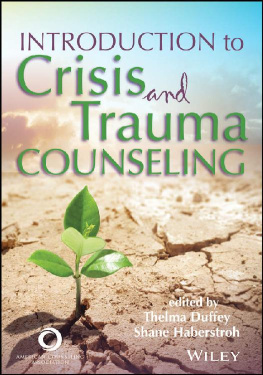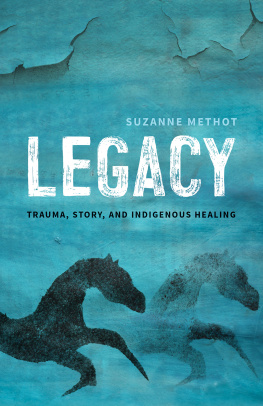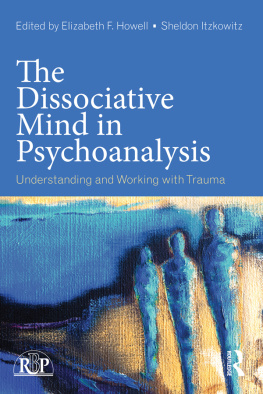S ERIES E DITORS : Allen E. Ivey and Derald Wing Sue
Healing the Soul Wound: Trauma-Informed Counseling for Indigenous Communities, Second Edition
Poverty, Psychology, and the End of Social Exclusion: Putting Our Practice to Work
M ADONNA G. C ONSTANTINE
Counseling and Psychotherapy with Arabs and Muslims: A Culturally Sensitive Approach
Learning from My Mothers Voice: Family Legend and the Chinese American Experience
Community Genograms: Using Individual, Family, and Cultural Narratives with Clients
S ANDRA A. R IGAZIO -D I G ILIO , A LLEN E. I VEY , K ARA P. K UNKLER -P ECK , AND L OIS T. G RADY
HEALING the SOUL WOUND
T RAUMA -I NFORMED C OUNSELING FOR I NDIGENOUS C OMMUNITIES
SECOND EDITION
E DUARDO D URAN
(T IOSPAYE T A W OAPIYE W ICASA )
Foreword by Allen E. Ivey

Published by Teachers College Press, 1234 Amsterdam Avenue, New York, NY 10027
Copyright 2019 by Teachers College, Columbia University
Cover design by Jeremy Fink. Cover photo by Kirienko Oleg / Shutterstock.
All rights reserved. No part of this publication may be reproduced or transmitted in any form or by any means, electronic or mechanical, including photocopy, or any information storage and retrieval system, without permission from the publisher. For reprint permission and other subsidiary rights requests, please contact Teachers College Press, Rights Dept.:
Library of Congress Cataloging-in-Publication Data is available at loc.gov
Names: Duran, Eduardo, 1949- author.
Title: Healing the soul wound : trauma-informed counseling for indigenous communities / Eduardo Duran (Tiospaye Ta Woapiye Wicasa) ; foreword by Allen Ivey.
Description: Second edition. | New York, NY : Teachers College Press, 2019. | Series: Multicultural foundations of psychology and counseling | Includes bibliographical references and index.
Identifiers: LCCN 2019036791 (print) | LCCN 2019036792 (ebook) | ISBN 9780807761397 (paperback) | ISBN 9780807763155 (hardcover) | ISBN 9780807778111 (ebook)
Subjects: LCSH: Indians of North AmericaMental health. | Indians of North AmericaMental health services. | Indians of North AmericaPsychology. | Indians of North AmericaCounseling of. | Psychotherapy.
Classification: LCC RA448.5.I5 D87 2019 (print) | LCC RA448.5.I5 (ebook) | DDC 616.890089/97--dc23
LC record available at https://lccn.loc.gov/2019036791
LC ebook record available at https://lccn.loc.gov/2019036792
ISBN 978-0-8077-6139-7 (paper)
ISBN 978-0-8077-6315-5 (hardcover)
ISBN 978-0-8077-7811-1 (ebook)
Upon suffering beyond suffering, the Red Nation shall rise again and it shall be a blessing for the sick world. A world filled with broken promises, selfishness and separations. A world longing for light again. I see a time of seven generations, when all the colors of mankind will gather under the sacred tree of life and the whole earth will become one circle again. In that day, those among the Lakota who will carry knowledge and understanding of unity among all living things, and the young white ones will come, to those of my people to ask for wisdom. I salute the light within their eyes where the whole universe dwells, for when you are at the center within you and I am at that place within me, we are as one.
Ta Shunka Witco, aka Crazy Horse (quoted in Larkin, 2012)
Foreword
I was deeply honored when asked to write the Foreword to this important book. Simply put, this second edition of Eduardo Durans Healing the Soul Wound is the most innovative and thought-provoking scholarship that Ive read in a long time. Duran combines personal experience, scholarship, and wisdom in a profound way. We see many blurbs about the wonders of each new book. But Durans book is something beyond the ordinary. Taken seriously and applied, it represents a paradigm shift that will transform theory and practice.
What can this book do for you, the busy scholar or practitioner? If you are Native American, you are in for a real treat, for here you have someone who speaks the truth in a way that will enable you to practice your beliefs in a way different from Western empirical approaches while still using their practical strategies. In addition, you will learn how to bring soul to the therapeutic process and become what Duran terms a soul healer.
If you are not of Native American origin, this book will be perhaps even more important to you. Youll discover a challenging critique of traditional therapy that, nonetheless, remains respectful of what is. Like me, youll have the dualistic Cartesian view of the world challenged. We learn how our culture has wounded not only People of Color but also all of us. In a sense we are all wounded healers whose thinking has been colonized by the past history and denial of cultural oppression. We need to analyze the historical context that lives on in the present as the soul wound within individuals.
Trauma does not disappear, even with the best cognitive behavioral therapy. It continues to live on and mutate over time. Survivors of the Native American genocide, the Holocaust, and the transatlantic slave trade bear the unconscious marks of the soul wound. Families of traumatized Vietnam veterans, alcoholics, and people who have experienced severe poverty and other challenges also bear the intergenerational legacy. The ideas that Duran presents here can be used with all these issues and more. Migration and immigration are also forms of trauma experienced by the displaced person. Most U.S. families have dealt with this trauma by denial, but it lives on in mainstream culture in ways that are damaging not only to the individual but also to society in general. The roots of racism and oppression lie partially in the denial of personal trauma and projection on the Other. These projections continue to wound our collective soul as we also take on soul guilt, clinically known as moral injury.
Beyond that, all of us can learn invaluable concepts and strategies that we can apply directly in our own practice. Durans case examples represent Native People, but all of the cases have direct implications for our own work. This is not just a new way of thinking; it is also a culturally specific approach that has profound implications for all counseling and therapy. The fierce urgency of the moment we live in requires that we attend to the healing of our collective soul. Therapeutic interventions described in this book give us a pathway into healing our soul, which is of many colors.
You can tell that Im a believer. I first encountered Eduardo Duran in the pages of the book, co-authored with Bonnie Duran, Native American Postcolonial Psychology (1995). That book is a classic; it also is must reading. In this new book, the notion of postcoloniality discussed in his earlier work is transformed into what Duran calls liberation psychology, which represents the next level of healing once awareness of the genesis of trauma is made conscious. Taken together, these two books have changed the way I think about counseling and therapy. This new and current work moves to the next level as it combines exciting theory with highly useful pragmatics of clinical practice. Let us all join with Eduardo Durans view of the past, present, and future.

